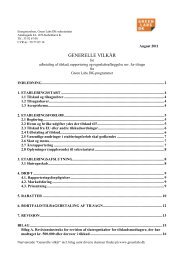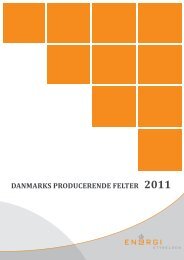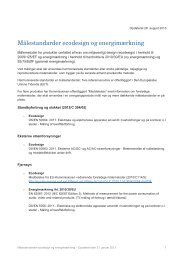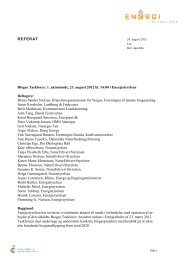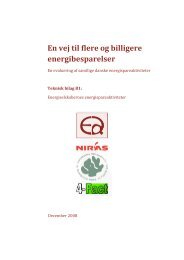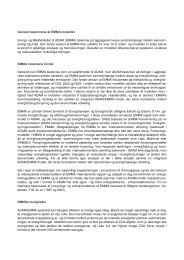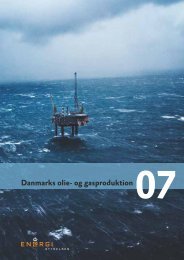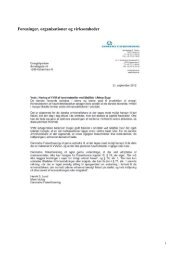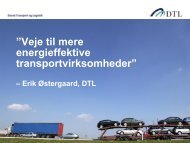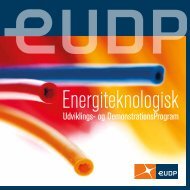Energy Strategy 2050 – from coal, oil and gas
Energy Strategy 2050 – from coal, oil and gas
Energy Strategy 2050 – from coal, oil and gas
Create successful ePaper yourself
Turn your PDF publications into a flip-book with our unique Google optimized e-Paper software.
A fully financed transition<br />
Micro economic effects of the transition<br />
The transition towards fossil fuel independence will<br />
strengthen growth opportunities considerably for Danish<br />
energy <strong>and</strong> climate companies. However, it is crucial for<br />
the government that the transition to fossil fuel independence<br />
takes account of the competitiveness of all<br />
Danish companies.<br />
Considered in isolation, financing the government’s new<br />
initiatives will incur additional costs for private businesses,<br />
growing gradually to DKK 1.2 billion in 2020. This<br />
represents approximately DKK 600 per employee or approximately<br />
0.1% of the gross added value in the entire<br />
private sector. In the longer term, it has been estimated<br />
that the burden will fall, in part as a result of falling costs<br />
of supporting RE production. Table 5.1 shows specifically<br />
what the initiatives will mean for energy costs for<br />
a medium-sized service company <strong>and</strong> a large energyintensive<br />
manufacturing company.<br />
The calculations have been made on the basis of fuel<br />
<strong>and</strong> tax assumptions for 2020; the year in which additional<br />
costs are estimated to be highest. The increase will<br />
take place gradually up to 2020. Companies therefore<br />
have good opportunities to adapt to the new conditions.<br />
For most of the business community, exemplified here<br />
by a medium-sized service company, this will involve<br />
modest additional costs <strong>and</strong> will not affect the competitiveness<br />
of companies. However, increases in PSO<br />
Fully implemented<br />
in 2020<br />
Medium-sized<br />
VAT-registered enterprise<br />
(About 250 employees)<br />
Large industrial enterprise<br />
in energy-intensive sector<br />
(About 400 employees)<br />
62<br />
Total energy<br />
expenditure<br />
without proposal<br />
Table 1: Examples of increases in energy costs in 2020 with the strategy in place<br />
<strong>Energy</strong> <strong>Strategy</strong> <strong>2050</strong> <strong>–</strong> <strong>from</strong> <strong>coal</strong>, <strong>oil</strong> <strong>and</strong> <strong>gas</strong> to green energy.<br />
Expenditure in<br />
connection with<br />
proposal without<br />
reduction of<br />
energy taxes<br />
contributions <strong>and</strong> taxes could impact competitiveness<br />
for a number of energy-intensive companies.<br />
Therefore, the government proposes that energy taxes<br />
on energy for industry be relaxed by DKK 0.4 billion, so<br />
that the whole business community escapes additional<br />
costs as a consequence of tax increases. However,<br />
companies will still contribute to renewable energy expansion<br />
<strong>and</strong> further energy efficiency efforts by paying a<br />
PSO contribution <strong>and</strong> a grid tariff. For a large, energy-intensive<br />
company, this will mean, that additional costs are<br />
reduced to approximately 1.3% of the company’s energy<br />
costs in 2020. This will ensure the right balance between<br />
competitiveness <strong>and</strong> the need for a fair distribution of the<br />
transition costs.<br />
Furthermore, the government will direct half of the increase<br />
in energy companies’ energy saving obligation towards<br />
production companies, for example as subsidies<br />
to purchase energy-efficient equipment etc. Enhanced<br />
energy saving efforts could be a competitive advantage<br />
for energy-efficient companies in periods of increasing<br />
energy prices.<br />
With regard to conversion to more biomass in electricity<br />
<strong>and</strong> heat production, it is still possible to differentiate the<br />
price of heating <strong>and</strong> in so doing take account of business<br />
customers. The government presupposes, that<br />
producers <strong>and</strong> buyers agree heating prices which are<br />
not unnecessarily detrimental to the competitiveness of<br />
businesses.<br />
Expenditure in<br />
connection with<br />
proposal with<br />
reduction of<br />
energy taxes<br />
Change in<br />
relation to a<br />
situation without<br />
the proposal<br />
DKK 0.65 mill. DKK 0.69 mill DKK 0.69 mill. +5,5 pct.<br />
DKK 100.0 mill. DKK 104.0 mill. DKK 101.3 mill +1,3 pct.



